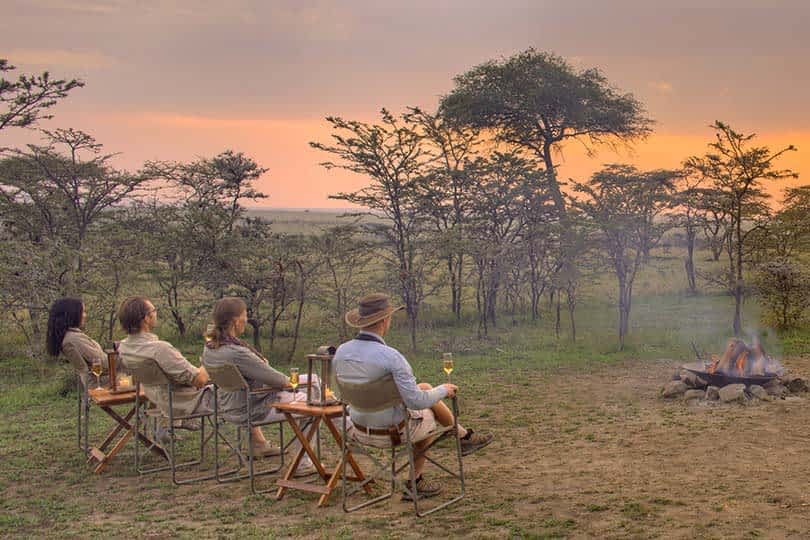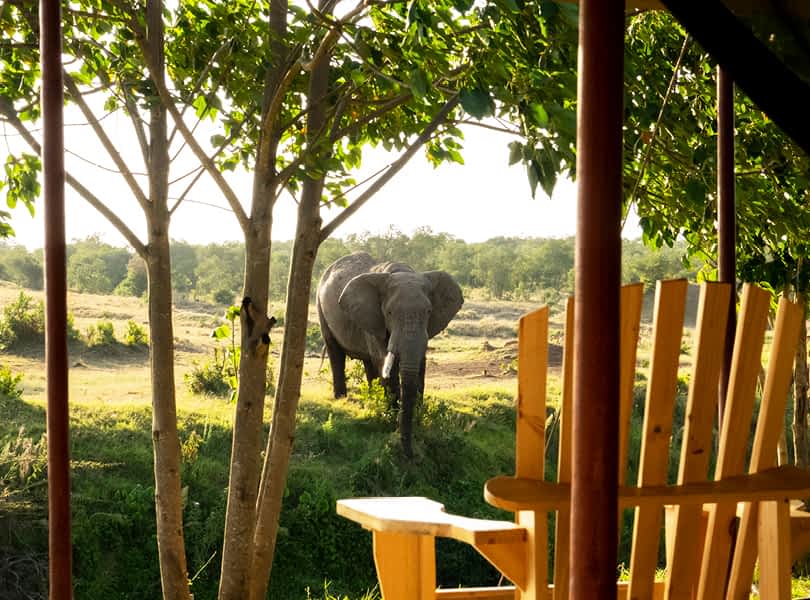When packing for your dream safari, choose comfortable, clothing that you can mix and match and can be layered to account for changes in the weather throughout the day.
You should bring at least one warm hoodie or jacket as it can get chilly, in the open Safari Jeep, in the morning and at the end of the Afternoon/evening game drive.
Earth tones colors such as khaki, brown, and tan are recommended, as they blend in well with the surroundings if you are doing activities such as walking safaris.
But if you are in the safari vehicle, animals see the vehicle as one big obstacle rather than individual people, so the color of your clothing is not as important.

Having said that, it’s best to avoid white or light-colored clothes, as it can get dusty driving around. And camouflage can be considered unlawful in East Africa as it is worn by the local forces, best to avoid it.
keep in mind luggage allowance, especially if you have internal flights, as there are weight limits on how much baggage you can take with you. Most lodges and camps provide laundry services.
If you are in a malaria area, it’s recommended to wear long-sleeved tops, trousers, and closed shoes, which also help protect you from the African sun.

Documents
- Passport
- Visa
Clothing guidelines
- Dinner outift(Option)
- T-shirts
- leggings
- Long-sleeve shirts for when it gets cooler and protect from misquto bites.
- Comfortable hiking boots (best not to get ones that are too bulky to take up to much room in your luggage)or sneakers, something you dont mind getting dirty.
- Warm hoodie, jacket or fleece with a collar for when it gets chilly in the morning and evenings.
- lightweight raincoat
- comfortable shorts.
- Socks, preferably ones that are long enough to overlap your leggings/pants to prevent mosquito bits
- Underwear
- Pajamas
- Swimsuit
- Pair of sunglasses (preferably with UV protection)
- A hat with a rim or cap to protect from the hot African sun.
- 1 warm woolen hat
- 1 swimsuit
- Pair of flip-flops or sandals (for wearing around camp)
- Money belt or neck wallet. Theft in major cities like Nairobi can be common. Protect your cash, credit card, passport, and phones by securing them in a neck wallet or money belt that can be worn underneath clothes,
- Comfortable pants, such as cargo pants or pants that can convert into shorts Clothing Arts.
- Toiletries
- Waterbottle (although most camps will provide you with drinks or waterbottles
- deodorant, skin care routine products, toothpaste, and toothbrush. There are rules on how much liquid and gels for carry on and check in bags.TSA requirements.
- Lip balm
- Sunscreen (minimum SPF 50+)
- Small antiseptic gel (for washing your hands when there’s no water around)
- Sanitary products for ladies
- Mosquito repellant
- Malaria pills
- Antihistamines for bug bites and allergic reactions
- Painkillers, e.g. aspirin or Tylenol
- Antiseptic cream
- Band-aids and antiseptic cream (optional every camp and drivers have one)
Electronic devices
- Camera
- Spare memory cards
- Spare camera battery
- Binoculars (if you have them, otherwise your safari guide will have a pair you can borrow)
- Spare AA and AAA batteries
- Universal travel adapter.
- A lock for your luggage, Always pack your valuables such as your camera in with your hand luggage.
- Phone or Go Pro for those quick shots and videos
Pack for a purpose
If you want to make a positive difference during your time away you can pack a few extra items such as pens and pencils.
What not to bring
Plastic disposable bags have been banned in Kenya.
US dollars printed before 2006
Jewelry, we strongly recommend leaving valuables such as jewelry at home
Co .



















